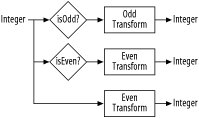Use a
SwitchTransformer
to apply a Transformer that is dependent on a
Predicate. A SwitchTransformer
models a switch statement, and it takes three
parameters: an array of Predicate instances, an
array of Transformer instances, and a default
Transformer. Example 4-9 uses a
SwitchTransformer to apply a different
Transformer implementation to odd and even
numbers.
Example 4-9. Using a SwitchTransformer
Transformer oddTransform = new Transformer( ) {
public Object transform(Object input) {
Integer number = new Integer( input );
return ( new Integer( number.intValue( ) * 2 );
}
}
Transformer evenTransform = new Transformer( ) {
public Object transform(Object input) {
Integer number = new Integer( input );
return ( new Integer( number.intValue( ) * 3 );
}
}
Predicate isEven = new Predicate( ) {
public boolean evaluate(Object input) {
Integer number = (Integer) input;
return( number.intValue( ) % 2 == 0 );
}
}
Predicate isOdd = new NotPredicate(isEven);
Predicate[] pArray = new Predicate[] { isOdd, isEven };
Transformer[] tArray = new Transformer[] { oddTransform, evenTransform };
Transform predicateTransform =
new SwitchTransform( pArray, tArray, new NOPTransformer( ) );
Integer one = new Integer( 1 );
Integer two = new Integer( 2 );
Integer three = new Integer( 3 );
Integer four = new Integer( 4 );
System.out.println( "Transform of 1 = " + predicateTransform.
transform( one ) );
System.out.println( "Transform of 2 = " + predicateTransform.
transform( two ) );
System.out.println( "Transform of 3 = " + predicateTransform.
transform( three ) );
System.out.println( "Transform of 4 = " + predicateTransform.
transform( four ) );If an object being transformed satisfies the isOdd
Predicate, it is passed to the
oddTransform
Transformer. If an
object being transformed satisfies the isEven
Predicate, it is passed to the
evenTransform
Predicate. If the
object satisfies neither Predicate, it is passed
to an instance of NOPTransformer, which is a
Transformer implementation that returns the object
passed to transform( ):
Transform of 1 = 2 Transform of 2 = 6 Transform of 3 = 6 Transform of 4 = 12
The array of Predicate instances and the array of
Transformer instances passed to the constructor of
SwitchTransformer must be of equal length. The
SwitchTransformer evaluates each of the
Predicate instances in the array. If a
Predicate evaluates to true,
the SwitchTransformer retrieves the
Transformer that corresponds to the matching
Predicate. If no Predicate
evaluates to true, the
SwitchTransformer passes the object being
transformed to the third parameter—the default
Transformer. In Example 4-9, the
default Transformer was a
NOPTransformer, which is a
Transformer implementation that performs no
transformation and returns the object passed to transform(). Figure 4-5 illustrates the
SwitchTransformer from the Solution; the two
Predicate instances correspond to two
Transformer instances.
Jakarta Commons Functor in the Commons Sandbox introduces a
UnaryFunction interface that provides an interface
equivalent to Transformer. A
UnaryFunction can be predicated with a
UnaryPredicate object via the
ConditionalUnaryFunction class. For more
information about UnaryPredicate
and
ConditionalUnaryFunction, see the Commons Functor
page at http://jakarta.apache.org/commons/sandbox/functor.
Get Jakarta Commons Cookbook now with the O’Reilly learning platform.
O’Reilly members experience books, live events, courses curated by job role, and more from O’Reilly and nearly 200 top publishers.


